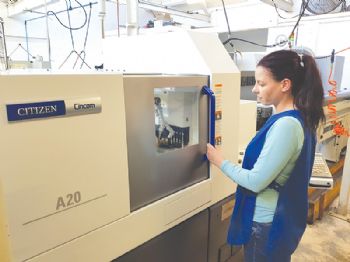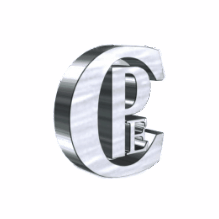
Enter The ability to change its recently installed Citizen Cincom A20-VII sliding-head turn-mill centre into a non-guide-bush variant for machining plastic components and short parts, while retaining the guide-bush assembly for longer parts, has allowed Colpa Precision Engineering to dramatically cut its lead times, significantly reduce material costs and obtain a greater number of parts from each bar.
General manager Martin Branch said: “The removable guide-bush feature on the Cincom A20 has increased our cost-effectiveness in what is a highly competitive market, as we no longer have to order pre-ground bar for plastics components; this has not only reduced material cost but also saved four weeks on our lead time — and enabled us to pick up new business.”
Mr Branch also says that by replacing an ageing Citizen Cincom C16 with the new A20 machine, Colpa is not only reducing cycle times but also improving productivity, consistency, up-time and machining accuracy.
Colpa Precision Engineering was set up in 1946; for the past 25 years, the company has been run by the current directors/proprietors — Dave Fry and Steve Low.
On-going investment has been consistent, and new machining centres and fixed-head lathes have been installed over the last three years — plus six Citizen sliding-head machines from Bushey-based Citizen Machinery UK Ltd (www.citizenmachinery.co.uk).
No going back
Ten people are employed at Colpa’s Watford site, where production batches vary from prototype and customer development parts to continuous production runs that deliver 32,000 parts a month.
“The recently installed Cincom A20-VII is now used mainly for plastic parts — along with a few aluminium components. Mr Branch said: “We ran our first production batch with the guide bush installed.
“We then removed it to machine a batch of short components, which only took 45min — and we have never used it again, such are the advantages of guide-bush-less operation on short parts.
“As a result, the Cincom A32-VII that we installed two years ago has now been dedicated to the production of mild-steel and stainless-steel components that require the use of a guide bush.”
Machining plasticsColpa’s customer base covers a wide variety of companies, including those in the optical, electronic, audio, music, pneumatics, commercial air -conditioning and aircraft industries, for which it machines parts from brass, mild steel, stainless steel, aluminium and titanium — plus a wide range of plastics (including PEEK and acetal), with cycle times generally varying between 45sec and 2min.
Mr Branch highlights two parts produced on the new A20-VII. One is a micro cable clamp produced in batches of 1,000 in white acetal to a ±0.05mm tolerance, the other is an intricate multi-featured anti-skate dial in black acetal that is machined in less than 2min in batches of 500.
The cable clamp, which is 9.5mm in diameter x 6mm long, is turned on the outside diameter, spot-drilled, drilled and tapped. A slitting saw next cuts a slot along the length of the OD into the drilled hole.
The part is then picked up by the sub-spindle (this has its clamping pressure governed, so as not to collapse the part) to produce a ‘cross-hole dimple’, chamfer the bore and undertake deburring in cycle.
Unground bar
Meanwhile, the anti-skate dial was transferred to the new machine from the existing A32 in order to free up its capacity for larger work and take advantage of using unground bar.
This part, which is 14mm in diameter x 14.75mm long, has features that include the head of the part with 12 milled slots (each with a 1mm radius at the bottom), a waisted spigot diameter, and a head undercut (this also features a 1mm-diameter cross-hole that breaks into the 2mm-diameter through bore).
The other end of the part has a cam lobe that is 5.22mm wide and protrudes by 4.75mm. The part is also drilled and tapped M3 x 6.5mm deep, and the head is counterbored with three diameters (8.5, 10.5 and 12.5mm to respective depths of 3.75, 3.0 and 1.75mm).
The five-axis Cincom A20-VII (its bar capacity can be extended to 25mm) has a 3.7kW 10,000rev/min main spindle, a 1.5kW 8,000rev/min sub-spindle, and a total of 21 tools; driven tools for cross machining have a maximum speed of 6,000rev/min and are powered by a 0.75kW drive.
The positioning speed is 32m/min, and the direct-indexing C axis can decelerate directly to the programmed position.
In conclusion, Mr Branch said: “The purchase of the Cincom M32 two years ago and the recent installation of the new A20 have enabled us to take on more-complex and more-profitable work.
“This has come from both existing and new customers, and it proves that continued investment cements the future of the company. The level of capability that these machines provide also gives us the confidence to continue with improving not only our production capability but also support areas such as inspection and measurement.”

